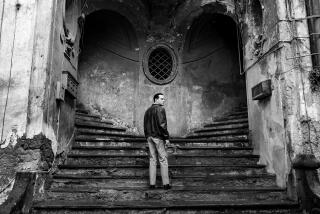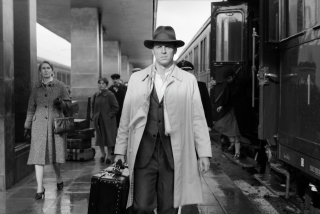‘The Bicycle Thief’ Returns in All Its Power
- Share via
Kino International, one of the most enterprising film distributors in the country, is marking the 50th anniversary of Vittorio De Sica’s “The Bicycle Thief” with its re-release on a new 35-mm print. This classic, a landmark in Italian Neo-Realism, is a perennial on critics’ all-time great films lists and is likely to remain so. As a style, Neo-Realism continues to flourish in Third World countries as a way of expressing the plight of the poor and oppressed in a manner that is gritty yet poetic.
As time passes, even the greatest films tend to linger in the memory more emotionally than visually, with a clutch of unforgettable images sticking in the mind rather than the entire film. If you have seen “The Bicycle Thief” before but not for years, you will discover that such is its power that it is like seeing it for the first time.
Simplicity is at the heart of “The Bicycle Thief,” as it is with so many films that endure. It is a film more of shades of gray rather than of black-and-white, and thus perfectly captures the drabness of Rome in the early postwar era, the grandeur of the Eternal City, as yet to be overlaid with modern glitz, serving as the dramatic backdrop for a harsh struggle for survival.
As a large group of men queues up outside a splendid old structure, an official, standing on a staircase, announces the names of the exceedingly few individuals lucky enough to be selected for jobs. One of them is Antonio Ricci (Lamberto Maggiorani), a slim, handsome man who will be hired to paste up posters advertising Rita Hayworth in “Gilda” all over the city--provided he has a bicycle. He does, but his enterprising wife Maria (Lianella Carell) has to pawn all her sheets to get her husband’s bicycle out of hock.
The Riccis have a baby and son Bruno (Enzo Staiola), a sturdy, bright boy of perhaps 9 or 10. They live in a bleak public housing project, but their apartment, though dingy, is spacious and even has some fine old pieces of furniture.
It never occurs to Ricci, a simple man, to buy a lock for his bicycle with the 1000 lira leftover from pawning the sheets. In very short order his bicycle is stolen, which sends father and son on a desperate search that takes them all over the city. They meet with indifference and kindness, their odyssey taking them into both a church service and a brothel. They think they spot the thief; they visit the vast used bicycle open-air markets in Piazza Vittoria and Porta Portese; they take shelter from the rain with a group of garrulous young German-speaking priests.
But as the search continues to be futile, the question becomes whether Ricci will be driven to take drastic measures. It is at this point that De Sica drives home the full toll exacted by years of fascism on decent, ordinary, hard-working Italian citizens and its terrible, timeless assault on human dignity.
David O. Selznick was so impressed with De Sica’s earlier “Shoeshine” that he offered to produce “The Bicycle Thief”--provided Cary Grant star, surely not one of the legendary Hollywood producer’s most inspired casting ideas, especially since Grant’s attempt to go against type several years earlier in “None but the Lonely Heart” was not a success with the public. De Sica countered with Henry Fonda, but Selznick didn’t think Fonda was at that time a big enough star. Fonda was not a bad idea, but, as it turned out, it was fortunate that De Sica went with nonprofessionals. They became the characters De Sica created for them without a trace of self-consciousness.
Neo-Realism is not synonymous with improvisation, though certainly Roberto Rossellini did some out of necessity in making “Open City” against the closing moments of the war. But “The Bicycle Thief” is in truth an elegantly structured film that took years of preparation. Integral to its grace and mood are Carlo Montuori’s superb, supple camera work and Alessandro Cicognini’s mesmerizing score, at once stately and possessed with an emotional fullness that Italian movies sustain best. It’s well worth keeping in mind that “The Bicycle Thief” will be at the Nuart for only one week.
* Unrated. Times guidelines: The film is suitable for all ages except the very young.
‘The Bicycle Thief’
Lamberto Maggiorani: Ricci
Enzo Staiola: Bruno, his son
Lianella Carell: Maria, his wife
A Cifex Film/Kino International release of a De Sica production. Producer-director Vittorio De Sica. Screenplay Cesare Zavattini, De Sica. Camera Carlo Montuori. Music Alessandro Cicognini. Film editor Eraldo de Roma. Running time: 1 hour, 29 minutes.
Exclusively at the Nuart, 11272 Santa Monica Blvd., West Los Angeles, through Thursday, (310) 478-6379.
More to Read
Only good movies
Get the Indie Focus newsletter, Mark Olsen's weekly guide to the world of cinema.
You may occasionally receive promotional content from the Los Angeles Times.










